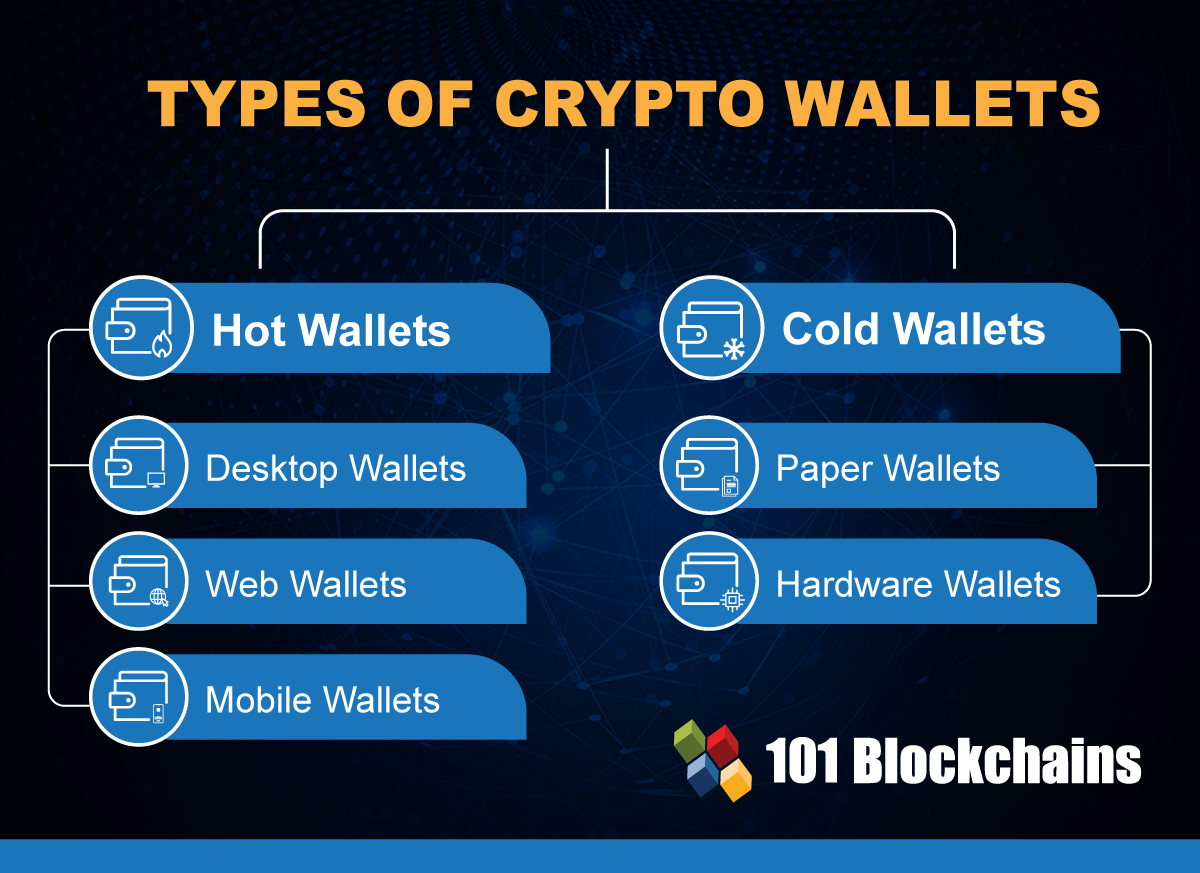Unlock your crypto career potential — become a Certified Cryptocurrency Professional (CCP)™ and master the skills that set you apart in the fast-evolving world of digital assets.

- Cryptocurrency
Diego Geroni
- on November 08, 2021
Different Types of Crypto Wallets – Explained
Cryptocurrency is changing the way we perceive money. It has been changing many conventional precedents in the financial services industry and has caught the attention of governments, investors, technology professionals, enterprises, and the general public all over the world. The radical growth in popularity of cryptocurrency fueled the growth in cryptocurrency use. However, many people wonder about where cryptocurrency is stored.
In the most basic sense, you can imply that cryptocurrency would obviously go into a crypto wallet. Therefore, the interest in learning about crypto wallet types has also been growing profoundly in recent times. People have concerns about the consequences of their selection of crypto wallets, as it is one of the most critical decisions before investing in cryptocurrencies. The following discussion provides a detailed overview of the types of crypto wallets you can use according to different requirements.
Want to become a Cryptocurrency expert? Enroll Now in Cryptocurrency Fundamentals Course
Why Should You Worry about Selecting a Crypto Wallet?
The foremost factor that might be striking your mind while reading this is the reason for doing the same. Why should you learn about the crypto wallet categories? One of the recent password leaks involved the exposure of almost 8.4 billion passwords. The leak included various old passwords as well as many current passwords for email and bank accounts. So, when you think of cryptocurrency and the money involved in it, it is quite important to think of security.
How will you store cryptocurrency? What will be the ideal method for using cryptocurrency to minimize loss? Could you get the advantage of security for storing your crypto assets? The answers to all these questions point out a clear impression of the different types of crypto wallet. So, you need to understand crypto wallets carefully for identifying the suitable alternative among available options for your requirements.
Curious to know the impact and in-depth understanding of crypto compliance in businesses? Join now in the Crypto Compliance Fundamentals Course.
What are Crypto Wallets?
Before you try to find out the answers to “What are the different types of cryptocurrency wallets?” you need to understand crypto wallets. First of all, you need to keep in mind that ownership of cryptocurrency is different from ownership of traditional currency. Cryptocurrency is not available in the physical form and is rather considered as a group of codes. On the other hand, cryptocurrency is stored on blockchain with a specific address. Users can leverage the public key to help other users in sending crypto assets. At the same time, you can use a private key for unlocking the crypto assets in the wallet.
You can think of a crypto wallet as a traditional wallet required for maintaining the safety of your funds. However, different crypto wallet types provide improved security measures in comparison to traditional wallets. As a matter of fact, crypto wallets never store the actual cryptocurrency. On the contrary, they ensure the storage of keys to the crypto assets. The crypto wallet could hold the information for connecting individuals to funds to ensure their safety.
Get familiar with the terms related to cryptocurrency with Cryptocurrency Flashcards.
Types of Crypto Wallets
When you purchase crypto from an exchange, you can technically store the crypto where you purchased it. If you purchase small amounts of cryptocurrency, then you can find it in your accounts initially, like a bank account balance. This is one of the basic crypto wallet categories you get by default when you purchase cryptocurrency. Most important of all, the wallets on the exchanges will also offer certain layers of security.
For example, cryptocurrency exchanges have insurance policies for safeguards against losses. In addition, funds are generally stored in the accounts with FDIC insurance. However, these security measures are sometimes not enough for addressing your concerns of safe storage for cryptocurrency. This is where you would need to find the suitable types of crypto wallets which can offer security. Let us take a look at the common types of wallets you can find for crypto assets.
Watch This Video To Know About Different Types of Crypto Wallets Right Now!
-
Hot Wallets
One of the foremost crypto wallet types brings hot wallets to the discussion. Hot wallets are basically the wallets that connect to the internet and generally offer lesser security. On the other hand, hot wallets offer better accessibility due to their connection with the internet. Even if hot wallets are vulnerable to fraudsters and hacker attacks, they are highly user-friendly.
-
Cold Wallets
Cold wallets are another prominent answer to ‘What are the different types of cryptocurrency wallets?’ next to hot wallets. They are basically specific variations of cryptocurrency wallets that are designed for cold storage. Cold storage implies that the wallets store the crypto tokens of users in offline mode. As a result, they serve as vaults that you can use for everyday transactions. Interestingly, there are some types of cold wallets that connect to the internet even while retaining their basic working functionality.
Therefore, it is quite clear that people with a larger amount of crypto assets would find better benefits with cold wallets. However, a combination of both cold and hot wallets could present better value advantages for crypto users. For example, a large share of funds could be stored securely in a cold wallet, with the hot wallet allowing better flexibility for funds. So, a hybrid approach with the two crypto wallet categories blended together could offer improved security alongside flexibility.
Explore detailed comparison between hot and cold crypto wallets on the basis of different value factors.
Types of Hot Wallets
Generally, you would find all the software wallets in the hot crypto wallet types. The most common types of hot wallets include mobile wallets, web wallets, and desktop wallets.
-
Desktop Wallets
Desktop wallets involve downloading an application to your desktop or laptop. The application will help in generating a data file for holding the keys of the users. Users should also create a password for accessing the keys. Desktop wallets offer the advantage of ownership of your key, albeit with risks of physical damage or malware/virus infection.
-
Web Wallets
Web wallets are one of the prominent types of crypto wallets in the category of hot wallets. You can access the web wallets through a web browser without the need for downloading any specialized software or application. With the help of browser access, web wallets ensure accessibility for crypto assets from any location with your password, a device, and a web browser. In the case of web wallets, the website would have ownership of the keys to your crypto assets. However, alternatives like multi-sig wallets offer a certain level of control to users over their crypto wallets.
-
Mobile Wallets
Mobile wallets are also one of the crucial crypto wallet categories in hot wallets with functionality similar to desktop wallets. You have to install a mobile application on the phone, which would serve as the hot wallet. Mobile wallets present better flexibility for exchanging funds while presenting some security risks.
Learn about how cryptocurrencies work, and the significance of crypto in the changing finance industry through AN INTRODUCTION TO CRYPTOCURRENCY FUNDAMENTALS Ebook
Types of Cold Wallets
The next important point of discussion regarding crypto wallet types would refer to the variants in the cold wallet category. You can find two common variants of cold wallets such as paper wallets and hardware wallets.
-
Paper Wallets
The name gives a lot away about paper wallets when it comes to understanding them as one of the types of crypto wallets. Paper wallets are nothing but physical pieces of paper. The paper must contain all the data you would need for accessing the cryptocurrency. Cold wallets generally offer additional security.
However, the same does not hold strong in the case of paper wallets. In event of losing the paper document, you have the risk of losing the crypto assets in the wallet. Furthermore, paper wallets also present the setbacks of limitations in sending partial funds easily. In addition, the time-consuming nature of transactions with paper wallets also presents formidable setbacks for their use.
-
Hardware Wallets
Hardware wallets, on the other hand, truly define the principles of designing a cold wallet. They offer security by completely avoiding the online exposure of private keys. Hardware wallets save private keys on a physical device in an offline environment and work just like a flash drive. Hardware wallets are one of the most easy-to-use crypto wallet types in cold wallets because you can connect them easily to computers or any other device by using a USB drive.
Even if the device is connected to the internet, the private key does not leave the device. The device would request the transaction details and provide validation for the data, thereby completing the transaction. Then, the transaction details go to the online network, where it is documented. Some of the popular hardware wallets which are in use presently include Trezor, Ledger, and many others from different manufacturers.
Build your identity as a certified blockchain expert with 101 Blockchains’ Blockchain Certifications designed to provide enhanced career prospects.
Bottom Line
The understanding of different types of crypto wallets is quite essential for sensible investment in cryptocurrencies. One of the formidable aspects which have been clearly evident in recent times in the domain of cryptocurrency is volatility. At the same time, security is also emerging as a vital concern with respect to investments in cryptocurrency.
However, a detailed overview of crypto wallets and their working alongside different variants helps users in finding suitable choices according to their requirements. The common variants of crypto wallets, hot wallets, and cold wallets, have their share of advantages and setbacks. You need to find the one which suits your needs best for dealing with cryptocurrencies. Learn more about crypto wallets and make the right decision now.
*Disclaimer: The article should not be taken as, and is not intended to provide any investment advice. Claims made in this article do not constitute investment advice and should not be taken as such. 101 Blockchains shall not be responsible for any loss sustained by any person who relies on this article. Do your own research!






